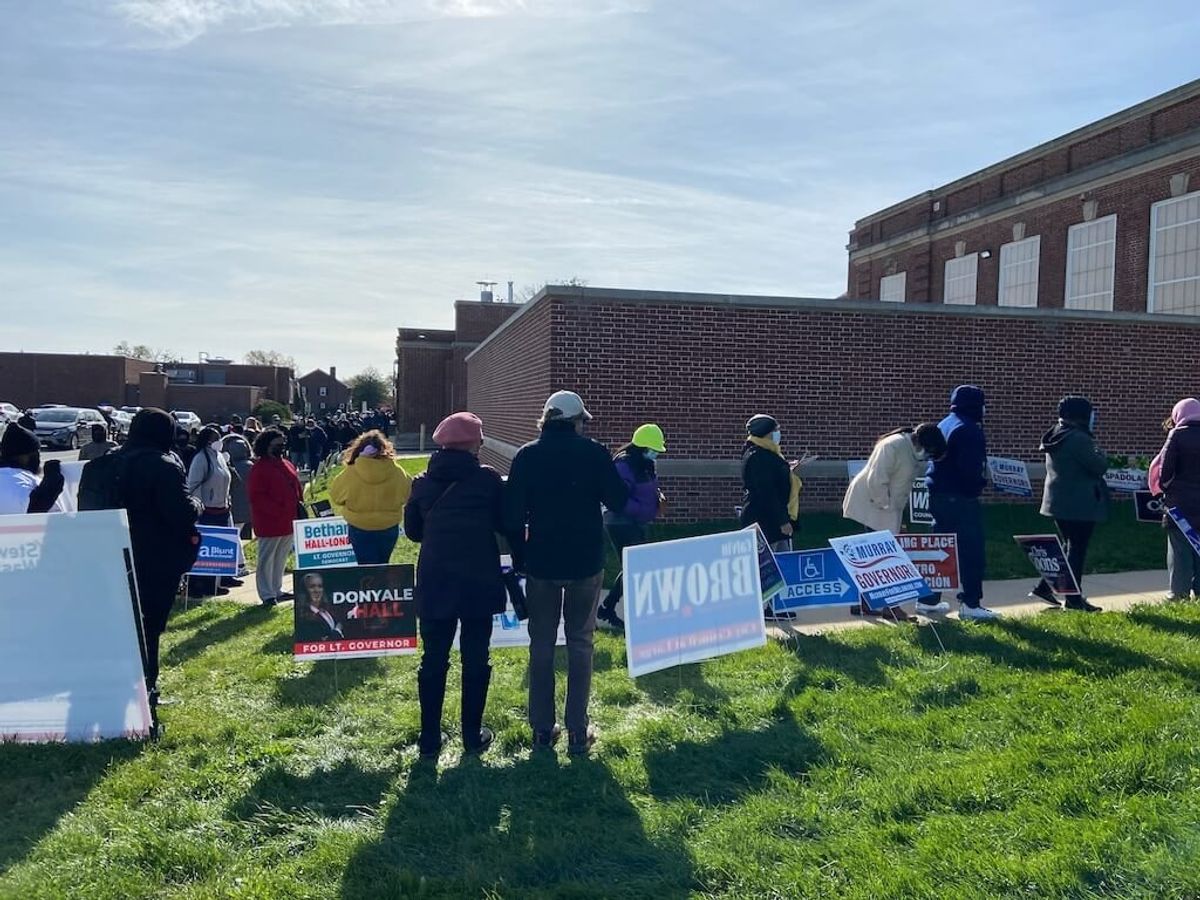
Election Day 2020: Americans Decide Between Trump and Biden
A grueling, bitterly fought U.S. presidential campaign comes to a close Tuesday.
Tens of millions of voters are casting ballots to decide whether to keep incumbent President Donald Trump as the country’s chief executive for the next four years or oust him in favor of former Vice President Joe Biden.
Latest developments
- Polls are open throughout the United States.
- Biden began Election Day by attending Mass at a Delaware church. Biden also is making appearances in two Pennsylvania cities before returning to Delaware to give an evening address.
- During a visit to his childhood hometown of Scranton, Pennsylvania Biden told supporters one of the reasons he is seeking the presidency is to “restore the soul of the country.”
- Trump started the morning by calling the “Fox & Friends” program and saying he would declare himself the winner “when there is victory, if there is victory.” Trump also visited his re-election headquarters outside Washington before returning to the White House.
- While visiting the headquarters, Trump was asked about last week’s U.S. Supreme Court decision to reject a Republican Party effort to block a three-day extension for Pennsylvania election officials to receive absentee ballots, meaning the court would not intercede in the state’s vote count. “I think it’s a very dangerous thing they’ve done with that decision,” Trump said.
- Trump also said he has not given thought to a concession or acceptance speech. “Hopefully, we’ll be only doing one of those two and, you know, winning is easy. Losing is never easy, not for me it’s not,” he said.
- Election officials in the most populous county in Ohio, Franklin County, said Tuesday it switched to paper poll books to check in voters after glitches in its electronic check-in system. The glitch does not affect voting machines.
- The U.S. Postal Service said there were delays in delivering ballots to election officials in the battleground state of Michigan, and in parts of the key states of North Carolina and Pennsylvania. The ballots, which election officials had not received as of Nov. 2, must be delivered by Election Day to be counted in Michigan. The ballots can be counted in the coming days in North Carolina and Pennsylvania if they are postmarked by Election Day.
- The U.S. Elections Project, which tracks early voting, said about 638,000 ballots had not been returned to Pennsylvania election officials by Nov. 2. The project said about 476,000 ballots in Michigan had not been delivered by that date.
- Acting Homeland Security Secretary Chad Wolf told reporters Tuesday morning there is “no indication” that a “foreign actor” has successfully interfered in the election.
- In some of the first Election Day ballots cast, Biden won all five votes in the small town of Dixville Notch, New Hampshire, while Trump won 16-5 in Millsfield, New Hampshire.
Record early voting
Amid the unchecked coronavirus pandemic in the U.S., more than 99 million people cast early ballots — more than two-thirds of the entire vote count of nearly 139 million in the 2016 election when Trump unexpectedly upset Democrat Hillary Clinton to win the White House.
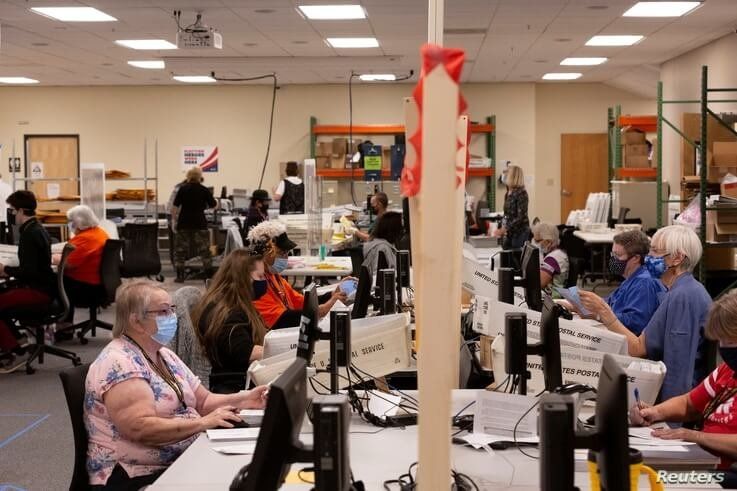
The presidential election is coming after a rancorous and combative campaign, with both Trump and Biden lobbing incendiary taunts claiming the other is unfit to lead the country and would take it to ruination.
Over the weekend, tensions mounted as thousands of Trump campaign supporters aggressively rallied and demonstrated throughout the country, in one case forcing a Biden campaign bus off a highway in Texas with a caravan of vehicles bearing Trump flags, and also tying up traffic on a New Jersey parkway.
 FBI Probing Trump Caravan Confrontation with Biden Campaign Bus in Texas Video footage showed a swarm of pickups and SUVs bearing pro-Trump flags surrounding the Biden campaign bus
FBI Probing Trump Caravan Confrontation with Biden Campaign Bus in Texas Video footage showed a swarm of pickups and SUVs bearing pro-Trump flags surrounding the Biden campaign bus
Authorities and merchants in some cities, including New York and Washington near the White House, have boarded up storefronts to prevent potential damage and looting in the event election-related violence erupts.
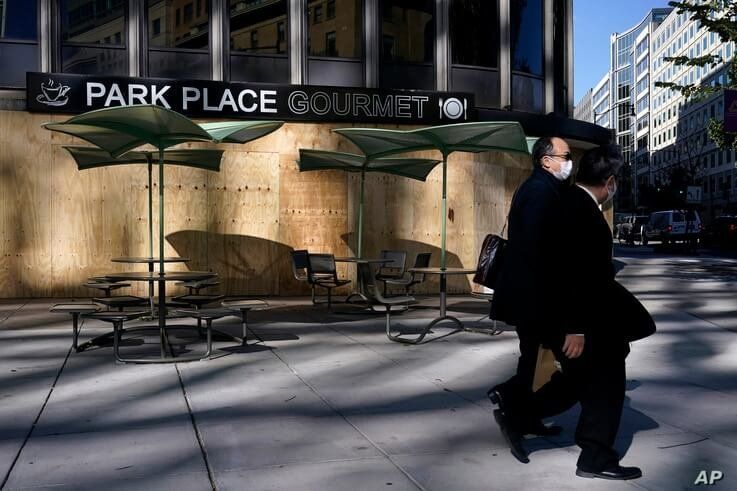
Many of the early voters — two-thirds of whom mailed in ballots while the rest cast votes in person — said they wanted to avoid coming face to face Tuesday with other people in long lines at polling stations, as the U.S. on some recent days has recorded more than 90,000 new coronavirus cases.
In the meantime, some Democrats said they wanted to be among the first to vote against Trump, to make him the third U.S. president in the last four decades to be defeated after a single term. Many Republicans said they planned to vote in person on the official presidential Election Day — the first Tuesday after the first Monday in November — as has been the norm in U.S. elections every four years for decades.
Voters are choosing between two septuagenarians, both of them older than the vast majority of the country’s 328 million citizens. Biden will be 78 by Inauguration Day on January 20, while Trump is 74. Whoever wins will be the oldest U.S. leader ever.
In addition, voters are choosing all 435 seats in the House of Representatives and 35 of the 100 seats in the Senate.
In the final days of the campaign, the two candidates traded schoolyard taunts about beating up each other, as well as more substantive attacks.
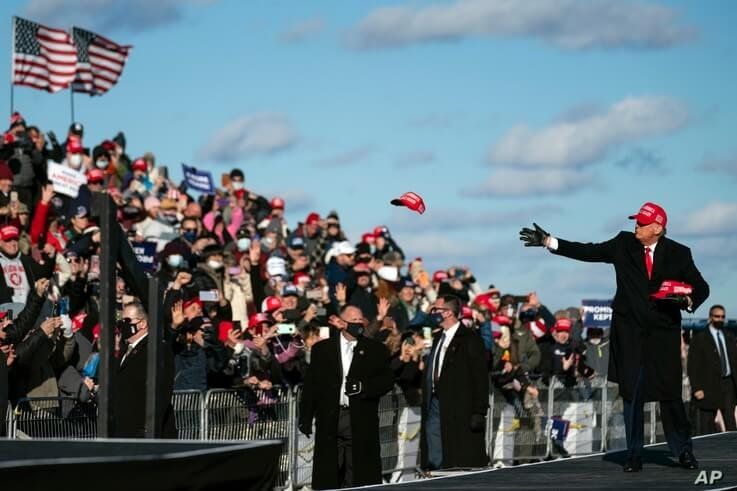
“He’s not a big guy,” Trump said of Biden, as he staged a string of rallies in the eastern battleground state of Pennsylvania. “A slight slap, you wouldn’t have to close your fist.”
Biden had his own memory of bygone days, saying of Trump, “When you were in high school, wouldn’t you have liked to take a shot?”
Trump claimed Biden has dementia that is “rapidly getting worse,” citing the Democrat’s verbal flubs on the campaign trail saying he was running again for the Senate, where he served for 36 years before eight years as vice president under former President Barack Obama.
Trump, the former New York real estate investor and reality TV star, and Biden, a fixture of Washington politics, could not be more different in temperament and policies.
The president, in the waning days of the campaign, has called the election “a choice between the American Dream and a socialist nightmare. … A choice between a Trump super-recovery and a Biden depression.”
Trump has claimed that Biden, if elected, would be beholden to the policy proposals of more progressive Democrats who are pushing for a government takeover of U.S. health care and a Green New Deal to control climate change, both of which the moderate Biden says he opposes.
Trump on COVID-19
Trump has repeatedly claimed that the U.S., with a world-leading coronavirus death toll of more than 231,000 people and 9.2 million infections, according to Johns Hopkins University, is “rounding the corner” in dealing with the pandemic, and promises that within weeks, the U.S. will have a vaccine against the coronavirus.
“I watched Joe Biden speak yesterday,” Trump said Saturday. “All he talks about is COVID, COVID. He’s got nothing else to say. COVID, COVID.”
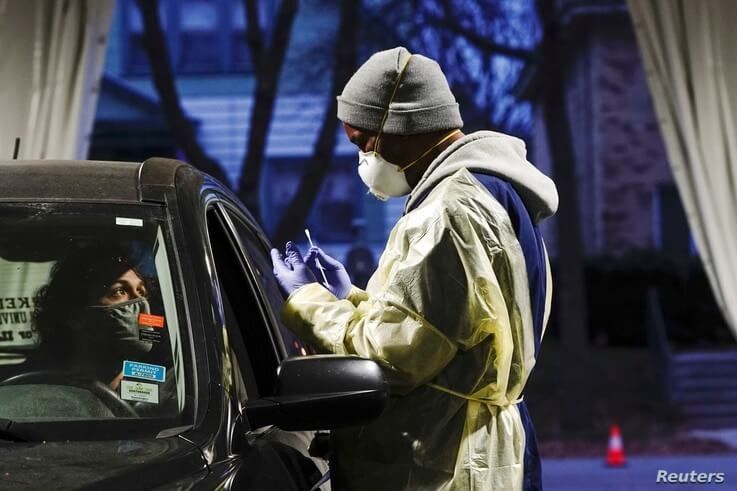
Biden on COVID-19
Biden has often assailed Trump’s handling of the virus, mocking him for suggesting months ago it could be treated by people ingesting bleach.
Biden told one rally, "Millions of people out there are out of work, on the edge” because of the pandemic. “Can't see the light at the end of the tunnel, and Donald Trump has given up. Donald Trump has waved the white flag, abandoned our families and surrendered to the virus.”
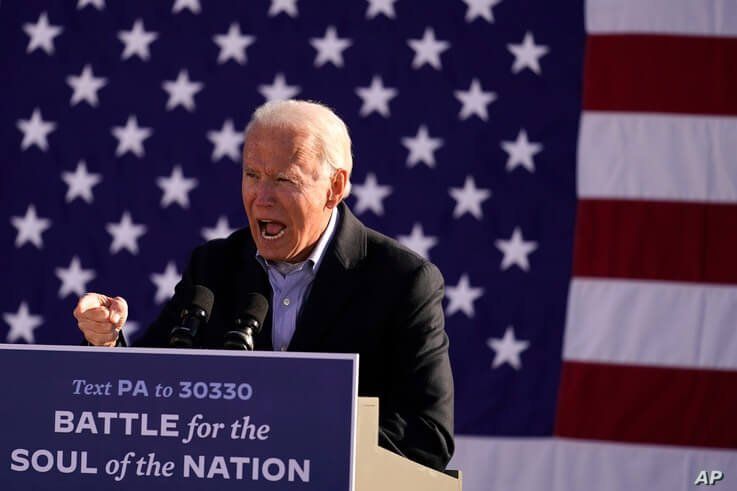
Biden said he would “choose hope over fear. We choose unity over division. Science over fiction. And yes, we choose truth over lies.”
“I don’t care how hard Donald Trump tries. There’s nothing — let me say that again — there’s nothing that he can do to stop the people of this nation from voting in overwhelming numbers and taking back this democracy,” Biden said at a rally in Flint, Michigan.
Electoral voting
National polls have for weeks shown Biden leading Trump nationally by about 7 or 8 percentage points, but only by about half that margin or less in key battleground states that are likely to determine the outcome.
The U.S. employs an indirect form of democracy, not a national popular vote, to pick its leaders. The outcome is effectively decided in state-by-state elections throughout the 50-state country and the national capital city, Washington, D.C.
The winner needs a 270 majority in the 538-member Electoral College. In all but two of the states, either Trump or Biden will win all the electors from an individual state by winning the popular vote there, with the most populous states holding the most electors.
Two lightly populated states — Maine in the Northeast with four electoral votes and Nebraska in the Midwest with five — award their electors by the outcome in individual congressional districts and the overall statewide vote, which could be a factor in an extremely close election.
The polling aggregator FiveThirtyEight.com says its 40,000 simulations of the election have Biden winning the presidency 89 out of 100 times.
But the political website cautions that Trump retains a chance of again prevailing in the determinative Electoral College, as he did in 2016, with close wins in several highly contested states, including Michigan, Wisconsin and Pennsylvania, to win all their electoral votes, even, as is expected, he again loses the national popular vote as occurred four years ago.
The math of the Electoral College aside, presidential historian Allan Lichtman at American University in Washington, is predicting a Biden win.
Lichtman’s 13 keys to presidential elections have correctly predicted the outcome of every U.S. presidential election since 1984, including Trump’s 2016 upset win.
This time, Lichtman says the elements in his analysis showed Trump heading to re-election until he mismanaged the pandemic.
Now, Lichtman says, it narrowly favors Biden by a 7-6 edge. It includes such factors as the ongoing economic recession in the U.S., social unrest stemming from the May death of a Black man, George Floyd, while in police custody and the fact that Trump’s support is linked to a narrow political base.
“The keys gauge the big picture of incumbent strength and performance, with the message that it is governing, not campaigning that counts in presidential elections,” Lichtman said in an interview posted by American University. “They do not readily change. They have never changed in the few weeks prior to an election."
 Anxious World Watches the Countdown to US ElectionNext PostJudge Rejects Republican Effort to Toss Out 127,000 Houston Votes
Anxious World Watches the Countdown to US ElectionNext PostJudge Rejects Republican Effort to Toss Out 127,000 Houston Votes







